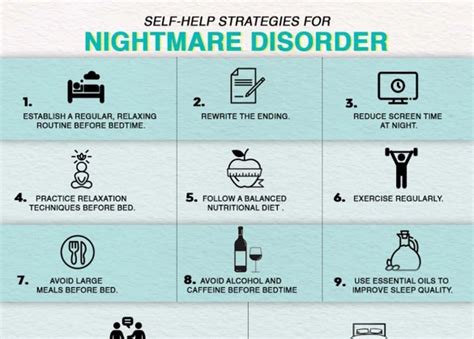Have you ever found yourself jolted awake by a bone-chilling nightmare, heart pounding and out of breath? These nocturnal terrors can wreak havoc on both our mental and physical well-being, leaving us feeling shaken and anxious long after we open our eyes. While nightmares may be a natural part of the human experience, it is essential to equip ourselves with effective techniques to handle them.
Dreams, often shrouded in mystery, have the power to take us on a rollercoaster ride through our deepest fears and insecurities. They intricately weave together our thoughts, emotions, and experiences, creating a tapestry of subconscious imagery that can be both awe-inspiring and downright terrifying. These vivid and often surreal narratives provide a unique window into our innermost selves, offering valuable insights into our emotions and unresolved conflicts.
However, when these dreams transform into nightmares, the experience can be profoundly distressing, leaving an indelible mark on our psyche. Nightmares can range from recurring scenarios that haunt us night after night to one-time terror-inducing events that leave us drenched in sweat. Regardless of their frequency, understanding how to navigate these unsettling dreams is crucial for maintaining our overall mental and emotional well-being.
Understanding Nightmares: Causes and Effects

Nightmares can be an unsettling phenomenon that can disrupt our sleep and leave us feeling anxious or fearful upon waking. In order to effectively handle and cope with nightmares, it is crucial to have a solid understanding of their underlying causes and the potential effects they can have on our minds and bodies.
Exploring the root causes of nightmares is essential in order to develop effective strategies for dealing with them. While each individual's experience may differ, common triggers for nightmares include stress, trauma, medications, and underlying mental health conditions. Understanding these factors can help us identify potential patterns and take proactive steps towards managing and preventing recurrent nightmares.
Furthermore, it is important to recognize that nightmares can have a profound impact on our emotional and psychological well-being. They can often leave us feeling fearful, anxious, or even traumatized. The effects of nightmares may extend beyond the immediate moment of waking up, affecting our mood, productivity, and overall quality of life. By comprehending these effects, we can work towards developing effective techniques for minimizing their impact and promoting a sense of peace and calmness.
By gaining an understanding of the causes and effects of nightmares, we can empower ourselves to take control of our sleep and mental well-being. Armed with this knowledge, we can begin to develop personalized strategies that address the root causes, manage the effects, and ultimately pave the way for a more peaceful and restful night's sleep.
An Exploration of the Psychosomatic and Emotional Impact of Disturbing Dreams
In this section, we will delve into the profound and intricate effects that unsettling dreams can have on our psychological and emotional well-being. We will analyze the intriguing connections between our subconscious mind and our conscious experiences, as well as the potential long-term consequences of recurring nightmares. Through a comprehensive exploration of the psychosomatic and emotional impact of these dreams, we aim to provide a deeper understanding of their significance and offer valuable insights into effectively addressing and managing their effects.
1. Psychological Impact: Here, we will illustrate the various ways in which disturbing dreams can affect our mental state. We will explore the potential links between past experiences, trauma, and the content of these nightmares, shedding light on how they can trigger emotional distress, anxiety, and even phobias. Additionally, we will discuss the process of dream interpretation and its role in uncovering underlying psychological issues.
2. Emotional Impact: This subsection will focus on the profound emotional responses that arise from encountering unsettling dreams. By examining the patterns of fear, sadness, anger, or helplessness commonly associated with these experiences, we will gain insight into the intricate connections between our dreams and our emotional well-being. Furthermore, we will delve into the potential impact of recurrent nightmares on our overall emotional stability and quality of life.
3. Long-Term Consequences: Within this segment, we will highlight the potential long-term consequences of enduring disturbing dreams. We will explore how the consistent presence of nightmares can lead to disrupted sleep patterns, heightened stress levels, and decreased overall psychological resilience. Moreover, we will examine the potential impact on daily functioning, productivity, and interpersonal relationships, emphasizing the importance of effectively addressing and managing these recurring dreams.
By immersing ourselves in this exploration of the psychological and emotional impact of disturbing dreams, we will gain valuable insights into the complexity of these experiences. Armed with a deeper understanding of their significance, we can begin to develop effective strategies for coping with and ultimately overcoming the negative effects that they may bring.
The Significance of Dream Analysis: Unveiling the Concealed Messages

Dreams hold an extraordinary power within them, serving as a gateway to a realm where the subconscious mind unravels its deepest secrets. By dissecting the enigmatic language of dreams, we gain a remarkable insight into our innermost thoughts, desires, and fears. The process of dream analysis empowers us to decode the hidden messages and symbols that reside within our dreams, leading us to a profound understanding of ourselves and the various aspects of our waking life. This compelling journey deepens our self-awareness and facilitates personal growth, enabling us to navigate the waking world with enhanced clarity and purpose.
Methods for Understanding Nightmares and Gaining Insight into Subconscious Thoughts
Exploring the deeper meaning behind nightmares can offer valuable insights into our subconscious minds and hidden emotions. By interpreting these unsettling dreams, we can unlock a deeper level of self-awareness and gain a better understanding of our inner thoughts and fears. In this section, we will discuss various methods for analyzing nightmares and how they provide us with the opportunity to delve into our unconscious minds.
Dream Journaling:
One effective method for interpreting nightmares is keeping a dream journal. By recording recurring themes, symbols, and emotions found in our nightmares, we can uncover patterns and gain greater insight into our subconscious thoughts. Writing down the details of our dreams immediately upon waking can help capture the vivid imagery and emotions experienced during the night. Over time, reviewing and analyzing these journal entries can reveal hidden meanings that may elucidate underlying anxieties or unresolved issues.
Symbols and Archetypes:
Another approach to understanding nightmares is by exploring the symbolic representations found within them. Dreams often feature various symbols and archetypes that hold personal meaning for us. These symbols can range from objects or animals to specific people or locations. By analyzing the significance of these symbols in the context of our own lives and experiences, we can gain a deeper understanding of the messages our subconscious is attempting to convey.
Emotional Reflection:
An essential aspect of deciphering nightmares is paying attention to the underlying emotions they evoke. Emotions experienced within dreams can provide valuable clues about unresolved issues or hidden fears. By reflecting on the emotions felt during a nightmare, we can begin to unravel the deeper emotional states that may be influencing our thoughts and behaviors in our waking lives. Identifying these emotions is a crucial step in gaining insight into our unconscious mind and understanding the sources of our nightmares.
Professional Guidance:
For those facing recurring nightmares or struggling to interpret their meanings, seeking the guidance of a mental health professional may be beneficial. Therapists and psychologists specializing in dream analysis can provide valuable insights into the symbolism and meanings behind recurrent nightmares. Through therapy sessions, individuals can explore their dreams in a safe and supportive environment, gaining a better understanding of their unconscious thoughts and addressing any underlying psychological issues.
By utilizing these methods for interpreting nightmares and gaining insight into unconscious thoughts, individuals can begin to unlock the captivating and enigmatic aspects of their dreams. Understanding the deeper meanings behind our nightmares can empower us to navigate our waking lives with greater self-awareness and emotional intelligence.
Creating a Serene Bedtime Ritual: Essential Elements of a Calming Evening Routine

In order to cultivate a tranquil sleeping environment and promote restful nights, it is imperative to establish a nightly routine that encourages relaxation and peace. By incorporating certain rituals into your evening schedule, you can effectively prepare your mind and body for a peaceful night's sleep. This section explores practical steps you can take to create a soothing bedtime routine that helps ward off nightmares and promotes a restorative slumber.
1. Embrace the Power of Relaxation Techniques
Incorporate relaxation techniques such as deep breathing exercises, meditation, or progressive muscle relaxation into your nightly routine. Engaging in these practices before bedtime can help alleviate stress and anxiety, allowing you to unwind more easily and prepare for a peaceful sleep.
2. Create a Tranquil Sleeping Environment
Transform your bedroom into a sanctuary of calmness by optimizing the physical aspects of your sleeping space. Enhance comfort levels by investing in a supportive mattress and pillows, while ensuring the room is cool, dark, and free from distracting noises. Adding soothing elements like essential oils or soft lighting can further enhance the serene atmosphere.
3. Disconnect from Digital Devices
To truly achieve a state of relaxation before sleep, it's crucial to disconnect from digital distractions. Limit screen time in the evening and avoid using electronic devices, such as smartphones or tablets, at least one hour before bedtime. Instead, engage in activities that promote relaxation, such as reading a book, taking a warm bath, or practicing gentle yoga stretches.
4. Develop a Consistent Sleep Schedule
Establishing a consistent sleep schedule is essential for maintaining a peaceful night's sleep. Aim to go to bed and wake up at the same time every day, even on weekends. This routine helps regulate your body's internal clock, making it easier to fall asleep and wake up feeling refreshed.
5. Reflect and Let Go
Before settling down, spend a few moments reflecting on the day's events, both positive and negative. This practice of mental reflection can help release any lingering stress or worries, allowing you to let go and relax more fully during sleep. Consider keeping a journal by your bed to jot down any thoughts or concerns before transitioning into a state of complete relaxation.
By incorporating these practical steps into your bedtime routine, you can create a peaceful and calming atmosphere that promotes a restful night's sleep. Cultivating these habits will not only help you handle and prevent nightmares but also ensure that you wake up feeling refreshed and rejuvenated each morning.
Tips and Techniques for Promoting Peaceful Sleep and Minimizing Disturbing Dreams
In this section, we will explore various strategies and practices that can be beneficial in improving the quality of your sleep and reducing the occurrence of unsettling nightmares. By adopting these tips and techniques, you may find yourself experiencing more restful nights and waking up feeling refreshed and rejuvenated.
1. Foster a calm bedtime routine: Establishing a peaceful pre-sleep routine can signal to your body and mind that it is time to unwind and relax. Consider engaging in activities such as reading a book, taking a warm bath, or practicing relaxation exercises like deep breathing or meditation.
2. Create a sleep-friendly environment: Make sure that your sleep environment is conducive to relaxation and tranquility. Keep your bedroom cool, dark, and quiet. Use comfortable bedding and invest in a supportive mattress and pillows. Consider using earplugs or a white noise machine if necessary.
3. Maintain a consistent sleep schedule: Establishing a regular sleep-wake cycle can help regulate your body's internal clock and promote healthier sleep patterns. Aim to go to bed and wake up at the same time every day, even on weekends.
4. Limit exposure to electronic devices before bed: The blue light emitted by electronic devices such as smartphones and tablets can interfere with your body's natural sleep-wake cycle. To promote better sleep, avoid using these devices at least an hour before bedtime. Instead, engage in relaxing activities or read a physical book.
5. Practice stress management techniques: Chronic stress and anxiety can contribute to the occurrence of nightmares. Explore different stress-reducing techniques such as yoga, mindfulness meditation, or journaling to help manage and alleviate stress levels before going to bed.
6. Regular physical exercise: Engaging in regular physical activity can improve the quality of your sleep and reduce the frequency of nightmares. Aim for at least 30 minutes of moderate exercise most days of the week, but avoid vigorous workouts close to bedtime.
7. Avoid heavy meals and stimulants before bed: Eating a heavy meal or consuming stimulants such as caffeine or nicotine too close to bedtime can disrupt your sleep. Try to have your last meal at least a few hours before bed and limit your intake of stimulants throughout the day.
8. Consider relaxation techniques for bedtime: Experiment with relaxation techniques specifically designed to promote better sleep, such as progressive muscle relaxation or guided imagery. These techniques can help relax your body and mind, creating a conducive atmosphere for peaceful sleep.
Remember, everyone's sleep patterns and experiences with nightmares are unique. It may take some trial and error to find the strategies that work best for you. However, by incorporating these tips and techniques into your routine, you can take proactive steps towards enhancing your sleep quality and minimizing distressing dreams.
FAQ
What is the best way to prevent nightmares?
There are several strategies that can help prevent nightmares. One effective approach is to establish a regular sleep routine, going to bed and waking up at the same time every day. Creating a peaceful and relaxing sleep environment, free from distractions, can also contribute to reducing nightmares. Additionally, managing stress through techniques such as meditation or deep breathing exercises can help prevent bad dreams. Lastly, avoiding stimulating activities or consuming heavy meals close to bedtime can minimize the chances of experiencing nightmares.
Are there any specific foods or drinks that can trigger nightmares?
While everyone's tolerance to certain foods and drinks may vary, there are some substances that have been associated with an increased risk of nightmares. These include caffeine, especially when consumed in the evening or close to bedtime. Alcohol can also disrupt the sleep cycle and potentially lead to more vivid dreams or nightmares. Additionally, some individuals may experience nightmares after consuming spicy or heavy meals before going to bed. It is advisable to pay attention to personal reactions to different foods and drinks and avoid those that seem to contribute to bad dreams.
What can I do when I wake up from a nightmare and feel anxious?
If you wake up from a nightmare and feel anxious, it can be helpful to engage in relaxation techniques to calm your mind and body. Deep breathing exercises, progressive muscle relaxation, or practicing mindfulness can all assist in reducing anxiety. It may also be beneficial to engage in a comforting activity, such as reading a book or listening to soothing music, to help shift your focus away from the nightmare and promote relaxation. If the anxiety persists, it is advisable to consult with a healthcare professional for additional support and guidance.
Is it normal to experience recurrent nightmares?
Experiencing recurrent nightmares is relatively common and can be attributed to various factors. Stress, trauma, anxiety, or certain medications can contribute to the frequency of bad dreams. It is important to recognize that recurrent nightmares can have a significant impact on quality of sleep and overall well-being. If recurrent nightmares persist and significantly affect daily functioning, it may be beneficial to seek professional help. A healthcare provider or therapist can assist in identifying underlying causes and developing effective strategies for managing and reducing the occurrence of nightmares.
Can nightmares be a sign of a larger mental health issue?
While occasional nightmares are generally considered normal and not indicative of a larger mental health issue, persistent or severe nightmares can be a symptom of an underlying condition. Post-traumatic stress disorder (PTSD), anxiety disorders, depression, and sleep disorders such as sleep apnea can all contribute to the presence of frequent and distressing nightmares. If nightmares significantly impact daily life or are accompanied by other concerning symptoms, it is crucial to consult with a healthcare professional for a comprehensive evaluation and appropriate treatment options.
What are some effective strategies for dealing with bad dreams?
There are several effective strategies for dealing with bad dreams. One approach is to establish a bedtime routine that promotes relaxation, such as taking a warm bath or practicing deep breathing exercises. Another strategy is to create a soothing sleep environment that is free from distractions. It can also be helpful to engage in stress-reducing activities during the day, such as exercise or meditation. Additionally, keeping a dream journal can allow for reflection and understanding of the recurring themes or triggers behind nightmares. Finally, seeking professional help, such as talking to a therapist or counselor, can provide valuable support and guidance in managing bad dreams.




